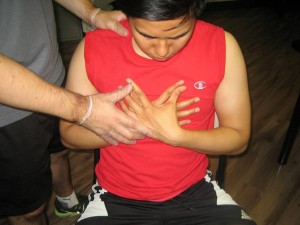Asthma is a disease affecting the airways and lungs. Generally, it is characterized by wheezing, shortness of breath and difficulty breathing. There is tightness in the chest, coughing at night, pressure and pain.
Asthma is due to inflammation and obstruction of the bronchial tubes that functions in inhaling and exhaling air. During an asthma attack, the muscles found around the bronchial tubes becomes tight and swollen which causes narrowing of the air passages and result to difficulty breathing.
Causes of asthma attacks

- Allergens such as grass, trees and pollen
- Irritants such as smoke or strong smells
- Flu
- Stress
- Severe heat
- Performing strenuous physical exercise
Symptoms
- Shortness of breath
- Difficulties in sleeping
- Tightness and pain in the chest
- Wheezing or whistling sound when breathing
- Coughing in an attempt to clear the airway and getting more air into the lungs especially at night.
- Low peak expiratory flow or PEF reading. It is a device measuring the speed of expiration to check the ability of the person to exhale air.
Treatment
- Take the prescribed oral and inhaled asthma medication which is usually taken both at the same time. Anti-inflammatory medications work to lessen the swelling and reduce the mucus in the airways to make breathing easier. Bronchodilators work by relaxing the muscles found around the airways to improve breathing and increase the amount of oxygen in the lungs. Bronchodilators are available in short or long term medications.
- Take the prescribed oral antihistamines such as diphenhydramine, cetirizine and loratadine to lessen and relieve symptoms of asthma. Nasal steroids work to lessen symptoms of the allergy.
- Maintain overall health by keeping the body healthy with diet and exercises. Perform regular exercises to strengthen the heart and lungs. It is also for maintenance of normal body weight. Eat a healthy well-balanced diet that includes a variety of fruits and vegetables.
- Perform deep breathing exercises to relax the body and relieve stress. Deep breathing distributes oxygen in the body, lessens the heart rate, normalizes the pulse and relaxes the body.
Tips
- Maintain regular immunizations from pneumonia and influenza.
- If there is a feeling of congestion, use an inhaler immediately.
- Avoid smoking and consumption of cold products especially during the winter season to prevent making the condition worse.
- Minimize fried foods to prevent further blockage of the airways.
- Avoid exposure to wood-burning stoves or fireplaces
- Practice deep breathing exercises.
Disclaimer / More Information
The material posted on this page on asthma attacks is for learning purposes only. Learn to recognize and manage respiratory issues including asthma attacks by taking a first aid and CPR class with one of our training providers.
FACT CHECK
https://www.webmd.com/asthma/guide/asthma-attack#1
https://acaai.org/asthma/symptoms/asthma-attack
https://www.mayoclinic.org/diseases-conditions/asthma-attack/symptoms-causes/syc-20354268
